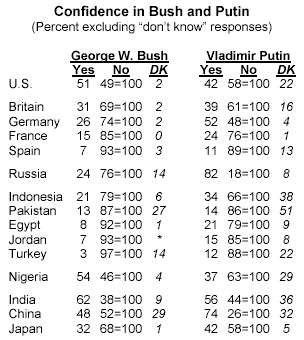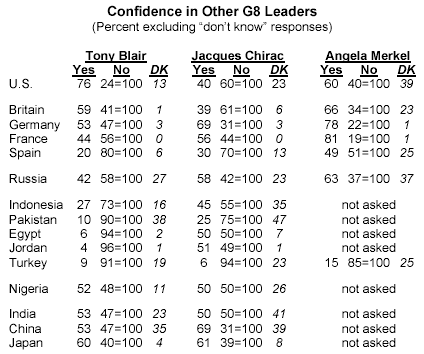by Jodie T. Allen
When President George W. Bush is greeted by his host, President Vladimir Putin at this weekend’s G8 summit meeting in St. Petersburg, neither leader can feel secure in the confidence placed in their leadership by the citizens of major countries around the globe. To be sure, Putin can take some comfort in the 82% level of confidence he inspired among the people of Russia in the latest Pew Global Attitudes Project survey. By comparison, Bush scored only a 51% confidence rating among those of his own countrymen who registered an opinion. But, with a few exceptions, neither man can point to substantial levels of support elsewhere in the world.

Outside of Russia, Putin scores his best confidence mark in China, where nearly three-in-four who offer an opinion say they have either “a lot” or “some” confidence in him to do the right thing regarding world affairs. Slightly less than half of the Chinese public (48%) says the same of President Bush.
And despite the long history of armed enmity between the two countries, 52% of Germans now express confidence in Putin. By contrast, only 26% of Germans place their confidence in Bush’s handling of international affairs.
Among those registering an opinion, Bush finds his highest levels of support in India (62%) and in Nigeria (54%) — the Nigerian vote owing much to the high level of confidence (86%) he inspires among Christians in that country. Putin can also point to majority — if somewhat lower — support in India (56%), but only a 37% rating in Nigeria.
Elsewhere in the Muslim world, neither leader scores well, with confidence in President Bush ranging downward from 21% in Indonesia through 8% in Egypt to a rock-bottom 3% in Turkey. President Putin does slightly better in Indonesia (34%) and Egypt (21%), though he too hits a low point in Turkey, with a small 12% confidence rating.
Indeed, it is striking that among the 15 countries surveyed on this question, the Turkish people almost uniformly express the lowest level of confidence in those among the G8 leaders about whom the question was asked in the 2006 survey. Perhaps more surprising, the citizens of Spain also register very low levels of confidence across the board, ranging from a high of 49% confidence in Germany’s new Chancellor Angela Merkel, to a mere 11% in Putin, and a low of 7% in Bush.
Among the other G8 leaders tested, newcomer Merkel does best both at home (78%) and among her Western European neighbors. In another ironic twist of history, fully 81% of the French trust her leadership in world affairs. For their part, the Germans return the compliment: While French President Jacques Chirac wins the confidence of only a 56%-majority of his countrymen, his world leadership is applauded by 69% of German citizens.

Chirac also scores better than the other leaders in the predominately Muslim countries covered by the survey, registering the confidence of a notable 51% in Jordan, 50% in Egypt and 45% in Indonesia. By comparison, Bush, Putin and British Prime Minister Tony Blair win little trust among these countries.
For his part, Blair secures the confidence of nearly six-in-ten (59%) among his own country’s public that he will do the right thing regarding world affairs — though only 31% of the British extend such confidence to President Bush. Blair, however, earns top-level trust among Americans, 76% of whom have strong or at least partial confidence in his handling of global issues, substantially more than the number of Americans expressing confidence in their own president.
Apart from Bush, Blair is also the “recognition leader” among Americans substantial percentages of whom, as seen in the “DK” column in the table, are unable to evaluate or, in some cases even identify, other leaders in the Western world.

